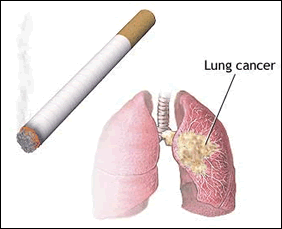HIV
Raises Lung Cancer Risk, but Smoking Is a Much Stronger Predictor
 |
 |
 |
 |
 |
 |
 |
| SUMMARY:
HIV infection is significantly associated with lung cancer,
increasing the risk by nearly 2-fold, but this was far overshadowed
by tobacco smoking, which raised the risk by almost 10-fold,
according to a study presented last week at the 17th Conference
on Retroviruses & Opportunistic Infections (CROI
2010) in San Francisco. Smoking-related risk declined
over time after quitting, but never fell to the level of people
who never smoked. |
|
 |
 |
 |
 |
 |
 |
 |
By
Liz Highleyman
 Recent
studies have shown that people with
HIV are at higher risk for non-AIDS-defining cancers overall especially
those with an infectious cause such as human papillomavirus but rates
for specific types of cancer have not been consistent. Some studies
have found that HIV appears to be independently associated with an increased
risk of lung cancer, but others have not. Recent
studies have shown that people with
HIV are at higher risk for non-AIDS-defining cancers overall especially
those with an infectious cause such as human papillomavirus but rates
for specific types of cancer have not been consistent. Some studies
have found that HIV appears to be independently associated with an increased
risk of lung cancer, but others have not.
To shed further light on this issue, Keith Sigel from Mt. Sinai School
of Medicine and colleagues analyzed lung cancer incidence in a large
cohort of HIV positive and negative individuals, adjusting for smoking
and other key confounding variables. Previous work investigating this
association has been limited by small sample size, lack of appropriate
HIV negative controls, or lack of smoking data, they noted.
The researchers merged data from the Veterans Aging Cohort Study Virtual
Cohort (a large administrative HIV cohort) and the Veterans Large Health
Survey (which contains detailed self-reported data about smoking), yielding
a cohort of 3707 HIV positive patients
and 9890 HIV negative control subjects.
The 2 groups were similar in terms of sex (about 90% men), race/ethnicity,
and age. However, the HIV positive participants were more likely that
the HIV negatives to smoke (32% vs 28%) and have a history of drug use
or heavy alcohol use (16% vs 10%).
Participants were followed for a median of 8 years; the HIV positive
group accumulated 28,500 person-years of follow-up, while the HIV negative
group amassed 76,800 person-years.
Lung cancer was defined using International Classification of Diseases
(ICD-9) codes. The investigators calculated incidence rates of lung
cancer, then determined adjusted incidence rate ratios (IRRs) adjusting
for age, race/ethnicity, smoking, and chronic obstructive pulmonary
disease (COPD).
Results
 |
The
overall incidence of lung cancer was 0.26 per 100 person-years among
the HIV positive participants, compared with 0.16 per 100 person-years
among the HIV negative controls (IRR 1.50). |
 |
The
IRR of lung cancer associated with HIV infection remained significant
after adjustment for smoking, age, race/ethnicity, and COPD. |
 |
In
a multivariate analysis, HIV infection was associated with an IRR
of 1.80, or 80% greater risk of lung cancer. |
 |
Smoking,
however, was associated with a much greater risk: |
| |
 |
Current
daily smoking: IRR 9.75, or nearly 10 times the risk; |
 |
Current
occasional smoking: IRR 3.37; |
 |
Recently
quit smoking: IRR 9.93; |
 |
Quit
smoking 1 or more years ago: IRR 5.14. |
|
"In
our cohort of demographically similar HIV-infected and HIV-uninfected
subjects, incidence of lung cancer was significantly increased in HIV-infected
subjects even after adjusting for smoking exposure," the investigators
concluded.
Of note, even occasional smoking increased the risk of lung cancer more
than HIV infection did, and ex-smokers remained at substantially elevated
risk even at the end of follw-up.
This study adds to the already substantial evidence that smoking is
a health hazard and quitting is beneficial. Another
study presented at CROI showed that smoking cessation lowered cardiovascular
risk in people with HIV, although the rate of all-cause death did not
fall as consistently.
Mt Sinai Sch of Med, New York, NY; Yale Sch of Med, New Haven, CT;
James J Peters VAMC, Bronx, NY; Univ of Pittsburgh Sch of Med, PA; Rutgers
Univ, Brunswick, NJ; Emory Univ Sch of Med, Decatur, GA; Baylor Coll
of Med, Houston, TX; George Washington Univ Sch of Med, Washington,
DC.
2/26/10
Reference
K
Sigel, J Wisnivesky, A Justice, and others. HIV Infection Is an Independent
Risk Factor for Lung Cancer. 17th Conference on Retroviruses & Opportunistic
Infections (CROI 2010). San Francisco. February 16-19, 2010. Abstract
30.
|
|